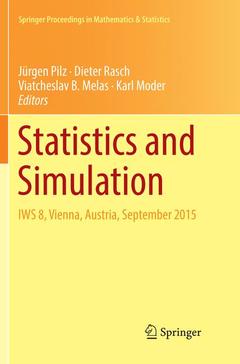Statistics and Simulation, 1st ed. 2018 IWS 8, Vienna, Austria, September 2015 Springer Proceedings in Mathematics & Statistics Series, Vol. 231

This volume features original contributions and invited review articles on mathematical statistics, statistical simulation and experimental design. The selected peer-reviewed contributions originate from the 8th International Workshop on Simulation held in Vienna in 2015. The book is intended for mathematical statisticians, Ph.D. students and statisticians working in medicine, engineering, pharmacy, psychology, agriculture and other related fields.
The International Workshops on Simulation are devoted to statistical techniques in stochastic simulation, data collection, design of scientific experiments and studies representing broad areas of interest. The first 6 workshops took place in St. Petersburg, Russia, in 1994 ? 2009 and the 7th workshop was held in Rimini, Italy, in 2013.
facility activation (Dmitry Efrosinin, Janos Sztrik, Mais Farkhadov, Natalia Stepanova).-
Viatcheslav Melas is a professor at the Department of Stochastic Simulation at the St. Petersburg State University, Russia. His research areas include experimental design, stochastic simulation and regression analysis, with a focus on functional approaches to optimal experimental design. He was one of the main organizers of the eight International Workshops on Simulation (1994 - 2015).
Karl Moder is head of the Center of Experimental Design at the University of Natural Resources and Life Sciences in Vienna, Austria, where he is also a professor at the Institute of Applied Statistics and Computing. His research areas include experimental design, multivariate statistics, and random number generation.
Jürgen Pilz is a professor and head of the Department of Statistics at the Alpen-Adria University Klagenfurt in Austria. He is the author of seven books and has published more than 150 scientific papers in the areas of Bayesian statistics, spatial statistics, environmental and industrial statistics, statistical quality control and design of experiments. He is an editorial board member of several international statistics journals.
Dieter Rasch works at the Center of Experimental Design at the University of Natural Resources and Life Sciences in Vienna, Austria. His research areas include size of experiments, constructing experimental designs and nonlinear regression. He was head of the Biometric Unit at the Research Centre of Animal Production in Rostock, Germany and a Professor of Mathematical Statistics at the Department of Mathematics at the University Wageningen in the Netherlands. He has published 275 scientific papers and 59 authored and edited books.
Presents contributions on simulation for mathematical modeling and analysis
Discusses simulation for stochastic processes
Includes studies on testing and classification problems in statistics
Covers simulation for reliability and queueing models
Date de parution : 12-2018
Ouvrage de 417 p.
15.5x23.5 cm
Date de parution : 05-2018
Ouvrage de 417 p.
15.5x23.5 cm



